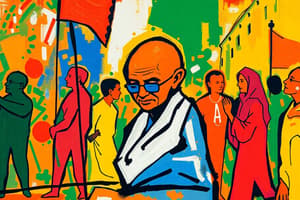Podcast
Questions and Answers
What was the significance of the term Satyagraha in Gandhi's movement against racial discrimination in South Africa?
What was the significance of the term Satyagraha in Gandhi's movement against racial discrimination in South Africa?
Satyagraha signified non-violent resistance and was used by Gandhi to uphold truth against racial injustices.
How did Gandhi’s experiences in South Africa influence his approach to the Indian Freedom Movement?
How did Gandhi’s experiences in South Africa influence his approach to the Indian Freedom Movement?
Gandhi's experiences in South Africa honed his strategies of non-violence and truthfulness, which he later applied in India’s struggle for independence.
What were the roles of the Natal Indian Congress and Indian Opinion in Gandhi’s activism?
What were the roles of the Natal Indian Congress and Indian Opinion in Gandhi’s activism?
The Natal Indian Congress organized Indian communities against discrimination, while Indian Opinion educated them on political issues.
In which Indian regions did Gandhi take leadership in the national movement, and what common goal did they share?
In which Indian regions did Gandhi take leadership in the national movement, and what common goal did they share?
What was the outcome of Gandhi's imprisonment for nine months during his time in South Africa?
What was the outcome of Gandhi's imprisonment for nine months during his time in South Africa?
Discuss the primary motivation behind Gandhi's involvement in the struggle against racial discrimination in South Africa.
Discuss the primary motivation behind Gandhi's involvement in the struggle against racial discrimination in South Africa.
Explain the significance of the term 'Satyagraha' as introduced by Gandhi.
Explain the significance of the term 'Satyagraha' as introduced by Gandhi.
What were the circumstances leading to Gandhi's imprisonment in South Africa?
What were the circumstances leading to Gandhi's imprisonment in South Africa?
What role did the 'Indian Relief Act' play in Gandhi's campaign for Indian rights in South Africa?
What role did the 'Indian Relief Act' play in Gandhi's campaign for Indian rights in South Africa?
Identify two notable organizations established by Gandhi to aid the Indian community in South Africa.
Identify two notable organizations established by Gandhi to aid the Indian community in South Africa.
Flashcards are hidden until you start studying
Study Notes
Mahatma Gandhi's Early Life
- Born on October 2, 1869, in Porbandar, Gujarat.
- Originated from a well-off family.
- Studied law in England, arriving in 1888.
- Returned to India as a Barrister-at-law in 1891.
- Worked as a lawyer in Rajkot and Bombay before moving to South Africa.
Experience in South Africa
- Arrived in Natal, South Africa in 1893, deeply shocked by racial discrimination against Indians.
- Assumed leadership in the struggle for Indian rights and against racial injustice.
- Founded the Natal Indian Congress to advocate for Indian residents' rights.
- Launched the newspaper Indian Opinion to inform and organize the Indian community politically.
Introduction of Satyagraha
- First employed Satyagraha, a strategy of non-violent resistance, during his struggles in South Africa.
- Protested against a humiliating law barring Indians from entering the Transvaal province.
- Used Satyagraha against a law that invalidated unregistered Indian marriages not conducted per Christian rites.
- Imprisoned for nine months due to his activism but released following the government's introduction of the Indian Relief Act.
Concept of Satyagraha
- The term Satyagraha combines two Sanskrit words:
- Satya (truth).
- Agraha (adherence, holding fast).
- Meaningfully interpreted as "holding on to truth."
Impact on Indian National Movement
- Revitalized national movements in India with principles of truth and non-violence.
- Instrumental in mobilizing the Indian populace against colonial rule.
- Led significant movements in:
- Champaran, North Bihar.
- Ahmedabad.
- Kheda, Gujarat.
Studying That Suits You
Use AI to generate personalized quizzes and flashcards to suit your learning preferences.




